Stardust
Stardust
In 1927, Charles Lindbergh flew solo from New York to Paris. President Calvin Coolidge announced he would not run for re-election. A tube of Pepsodent toothpaste cost 50 cents. The hit songs of the day were "Old Man River" and "Bill" from the musical "Showboat." And in 1927, Hoagy Carmichael wrote a melody that would become one of the greatest hits of all time, "Stardust."
Stardust
According to Carmichael, the inspiration for “Stardust" came to him while he was on the campus of his alma mater, Indiana University, in Bloomington, Indiana. He began whistling the tune then rushed to the Book Nook, a popular student hangout, and started composing. Carmichael studied to be a lawyer, where he met jazz trumpeter Bix Beiderbecke. The melody for “Star Dust” emerged from an improv session with Beiderbecke.
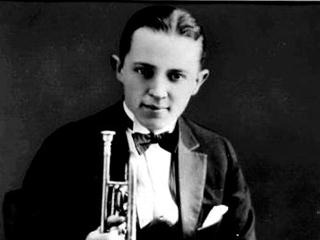
Bix Beiderbecke
On October 31, 1927, Hoagy Carmichael and His Pals recorded “Star Dust” at the Gennett Records studio in Richmond, Indiana. Hoagy’s “pals,” Emil Seidel and His Orchestra, agreed to record the medium-tempo instrumental in between their Sunday evening and Monday matinee performances in Indianapolis, seventy miles away.In 1928 Carmichael again recorded “Star Dust,” this time with lyrics he had written, but Gennett rejected it because the instrumental had sold so poorly. The following year, at Mills Music, Mitchell Parish was asked to set lyrics to coworker Carmichael’s song. The result was the 1929 publication date of “Star Dust” with the music and lyrics we know today. The Mills publication changed the title slightly to “Star Dust” from “Stardust” as it was originally spelled.
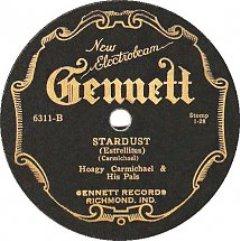
Hoagy Carmichael & His Pals - Stardust 1928
Hoagy Carmichael (1899 - 1981) was influenced by his mother, who played piano at local movie houses, and by the music of black jazz ensembles. But he went on to study law where he organized a band. Success was slow in coming, but he recorded some songs for Mills Music which were picked up by leading bands. Mildred Bailey had hits with “Rockin’ Chair” in 1929 and “Georgia on My Mind” in 1932 (lyrics by Stuart Gorrell).
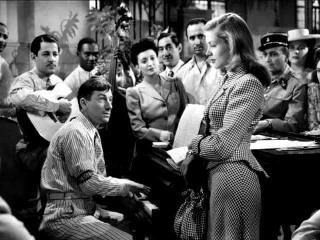
Hoagy Carmichael
In 1936 Carmichael headed to Hollywood for success both on and off screen. He established his persona as a pianist/singer—hat tipped back, coatless, cigarette hanging from his lips—in the Bogart/Bacall film 'To Have and Have Not' (1942), and people loved his relaxed, nasal delivery. By 1946 he had three songs on the Hit Parade, and in 1951 he and Johnny Mercer won an Oscar for “In the Cool, Cool, Cool of the Evening.” Other Mercer collaborations turned out “Lazy Bones” (1931) and “Skylark” (1941). But it is “Stardust” (1928) for which Carmichael is best remembered. At one time “Stardust” was the most recorded song, with more than a thousand versions that cross genres and styles. That time has long passed but it remains a most beloved entry in the Great American Songbook (GAS).
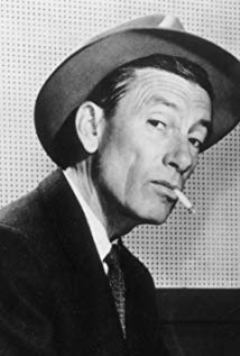
Hoagy Carmichael
Mitchell Parish (1900 - 1993) was born in Lithuania and arrived in the United States at the age of seven months. An early interest in literature and poetry piqued his desire to write lyrics. He plugged away at it until he had his first success with Cliff Burwell, “Sweet Lorraine” (1928). But it was in 1929, when he contributed the lyrics to “Stardust,” that the Parish name entered the music history books.
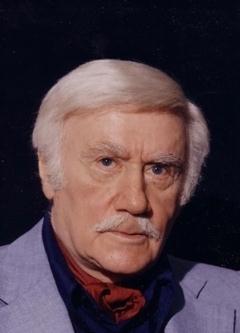
Mitchell Parish
Unlike so many standards, “Stardust” did not originate in a musical show or film. It is a stand-alone song, introduced at the famed Cotton Club in New York’s Harlem. Later that same year, the song was introduced to the mass audience by the popular Isham Jones dance band. His 1930 recording, which featured a violin solo by Victor Young, became a best seller. In 1931, Young, this time with his own orchestra, gave “Stardust” a concert treatment that featured the Boswell Sisters, who took liberties with Carmichael’s melody. In that same year “Stardust" received two other fine recordings by Bing Crosby and Louis Armstrong with Satchmo’s signature trumpet on the intro, and the stargazing reverie of the vocals. Crosby got very playful with the song, scatting and whistling and, at various points, improvising on the melody, even exchanging phrases with the saxophonist Jimmy Dorsey.
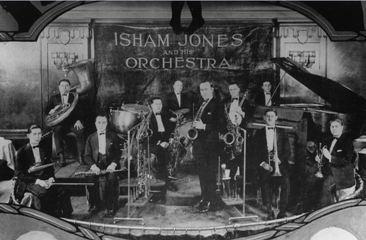
Isham Jones and His Orchestra
In 1940, Artie Shaw and his orchestra recorded it and sold a million copies. By then, it was a standard. All the big bands had "Stardust" in their books. World War II gave the song a different context. Love and loss became the theme of popular music, separation and memories of love. After the war, Artie Shaw's band recorded "Stardust" again.
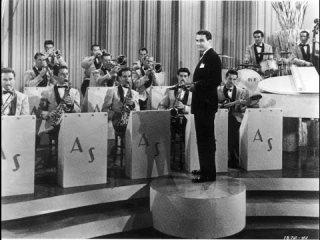
Artie Shaw and His Orchestra
Although several singers had recorded it by the time he got the opportunity to put it on vinyl, and even though his own version wasn’t even the biggest hit version of “Stardust”, somehow Nat King Cole’s version of the song quickly became the standard. With his silky tone and great control, Nat King Cole made “Stardust” sentimental and reflective without being overly-emotional or maudlin.
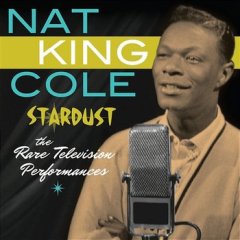
Nat King Cole - Stardust
“Stardust” is an unusual song for the late 1920s and perhaps any era. Carmichael’s complex melody consists of wide leaps and unexpected turns from major to minor, outlining the jazz-oriented harmonies with many sevenths, ninths and thirteenths. Also, starting with a minor chord on the second degree of the scale was very daring. Singer Mel Torme, once noted that the verse “rambles up the scale and down, resembling nothing so much as an improvisational cornet solo.” Then he adds “It is one of the most bittersweet examples of ‘lost love’ ever written.” Oscar Hammerstein II, comments in the preface of his book Lyrics that “ ‘Star Dust’ rambles and roams like a truant schoolboy in a meadow. Its structure is loose, its pattern complex. Yet it has attained the kind of long-lived popularity that few songs can claim. What has it got? I’m not certain. I know only that it is beautiful and I like to hear it.” Given such complexity, the song’s huge success is all that more remarkable. Mitchell Parish’s lyrics are likely integral to that success.
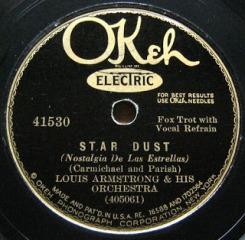
Louis Armstrong - Stardust 1931
In 1978, more than 50 years after this song was written on a college campus in the heartland of the nation, a popular country singer introduced it to new generations. Today, people who never heard of Isham Jones or Artie Shaw or even composer Hoagy Carmichael know his work thanks to Willie Nelson. "Stardust," an American song of longing, dreams, desires, still stretches across the decades to touch the spirit of anyone who hears it. In his autobiography, 'Willie,' Nelson recalled the first night he performed it with his band at the Austin Opera House. "There was a kind of stunned silence in the crowd for a moment, and then they exploded with cheering and whistling and applauding. The kids in the crowd thought 'Stardust' was a new song I had written. The older folks remembered the song well and loved it as much as I did."

Willie Nelson plays Stardust
“Stardust” lyrics
And now the purple dusk of twilight time, Steals across the meadows of my heart, High up in the sky the little stars climb, Always reminding me that we're apart. You wander down the lane and far away, Leaving me a song that will not die, Love is now the stardust of yesterday, The music of the years gone by. Sometimes I wonder why I spend, The lonely nights dreaming of a song, The melody haunts my reverie, And I am once again with you. When our love was new, And each kiss an inspiration, But that was long ago, Now my consolation, Is the stardust of a song. Beside a garden wall, When stars are bright, You are in my arms. The nightingale tells his fairy tale, A paradise where roses bloom, Though I dream in vain. In my heart it will remain, My stardust melody, The memory of love's refrain.

Stardust
Willie Nelson - Stardust
Last Updated (Thursday, 16 May 2019 21:42)
